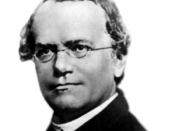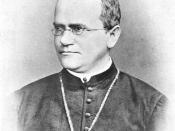It is ingrained among most people that important discoveries and concepts are results of concerns about problems of huge complexity. Nevertheless, if we allow more reasoning about that, we are bound to find out that is not always the case since history has been showing us plethora of , say, cientific development triggered by investigation over facts often dismissed as trifles.
In order to bolster the argument just stated, it will be useful to refer to the pioneer of Genetics, namely Mendel. Those who would doubt a reclusive monk could make any good science out of growing peas will be appalled by his outstanding achievements. Mendel, tending the pea trees as usual, realised that the collor of the pea beans, whether green or yellow, could be predicted under some controlled unaccuracy provided the "parents" trees were known. Moreover, after several experiments sedulously carried out, he came to the conclusion that the collor outcome in question was result of the crossing of the parents' features following some determinative selection rules.
Then "gene" concept was born and proved to be correct and useful through nowasdays.
Apart from the preceding historic report, we can think of a number of other instances in which everyday facts conceal valuable information just waiting to be uncovered such as symmetry in a snowflake, shape of droplets, reflection upon a lake, waves ruffling around a bathtube, wings of a butterfly etc. Were we to look carefuly into them, we would come up with a lot of physical facts almost ubiquitious in nature whose consequences are more complexes than one can imagine.
Therefore, it is seems to be clear that the best ideas quite often result of looking into passionately into simple thing surrounding us. Methaphorically speaking, nature tell us her secrets in the silence of...



"Best Ideas Arise from..."
Pretty good essay. Worded a little wierd in some places, but never the less, still good.
5 out of 5 people found this comment useful.